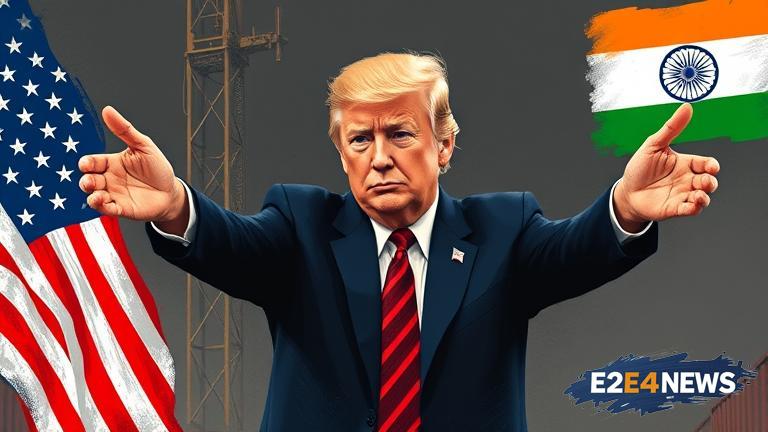The Trump administration has recently intensified economic pressure on India, a move that is likely to escalate trade tensions between the two countries. This development comes as the US seeks to renegotiate trade agreements and reduce its trade deficit with India. The US has been critical of India’s trade practices, citing concerns over market access and intellectual property protection. In response, the US has imposed tariffs on certain Indian goods, including steel and aluminum. India has retaliated with its own set of tariffs on US products, including agricultural goods and chemicals. The trade tensions between the US and India have been simmering for months, with both countries engaging in a war of words over trade policies. The US has accused India of unfairly subsidizing its exports, while India has alleged that the US is trying to stifle its economic growth. The trade dispute has significant implications for both countries, with the US seeking to protect its domestic industries and India trying to maintain its economic momentum. The Indian government has been trying to navigate the trade tensions, with Prime Minister Narendra Modi seeking to balance the country’s economic interests with its strategic relationship with the US. The US-India trade relationship is complex, with both countries having significant trade and investment ties. The US is one of India’s largest trading partners, with bilateral trade valued at over $140 billion. However, the trade deficit between the two countries has been a point of contention, with the US seeking to reduce its trade deficit with India. The Trump administration has been using tariffs as a tool to negotiate trade agreements, a strategy that has been criticized by many countries, including India. The trade tensions between the US and India have also been influenced by other factors, including the ongoing trade war between the US and China. The US has been seeking to strengthen its trade relationships with other countries, including India, as it tries to counter China’s growing economic influence. However, the trade tensions between the US and India have raised concerns about the impact on global trade and economic growth. The World Trade Organization (WTO) has warned about the risks of a trade war, citing concerns over the impact on global trade and economic stability. The trade dispute between the US and India has also been influenced by domestic politics, with both countries facing elections in the near future. The Indian government has been trying to manage the trade tensions, with the country’s commerce minister, Piyush Goyal, seeking to negotiate a trade deal with the US. The US-India trade relationship is critical for both countries, with significant implications for global trade and economic growth. The trade tensions between the two countries have raised concerns about the impact on businesses and consumers, with many companies seeking to navigate the complex trade landscape. The Indian government has been trying to promote its ‘Make in India’ initiative, which aims to boost domestic manufacturing and reduce the country’s dependence on imports. However, the trade tensions with the US have raised concerns about the impact on India’s economic growth, with many economists warning about the risks of a trade war. The US-India trade relationship is likely to remain a key issue in the coming months, with both countries seeking to negotiate a trade deal that addresses their concerns. The trade tensions between the US and India have significant implications for global trade and economic growth, with many countries watching the developments closely.





